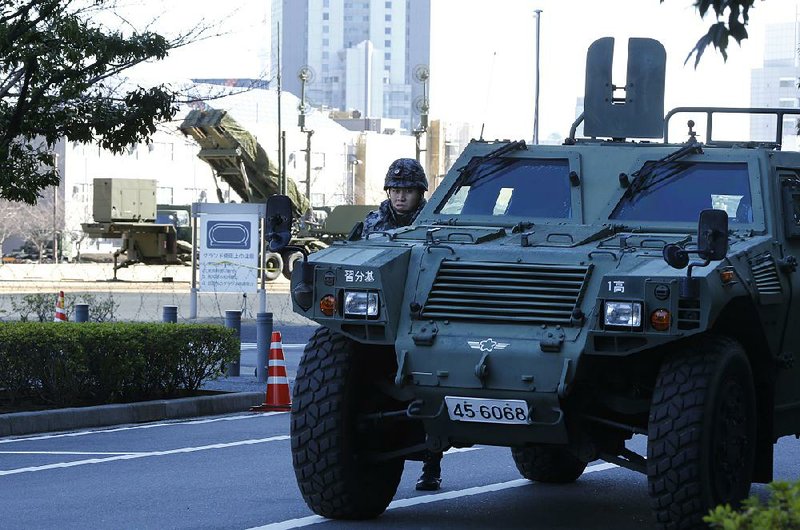SEOUL, South Korea -- North Korea today defied international warnings and launched a long-range rocket that the United Nations and others call a cover for a banned test of technology for a missile that could strike the U.S. mainland.
The launch, which South Korean officials confirmed about two hours after an eight-day launch window opened this morning, comes after North Korea's widely disputed claim last month to have tested a hydrogen bomb. It is expected to be considered by Washington and its allies to be a further provocation and to draw more sanctions and condemnation from the United Nations.
The rocket put the "Kwangmyongsong," or "shining star," Earth observation satellite into space today, North Korean anchorwoman Ri Chun Hui said on state television. Ri also said that North Korea will launch more satellites.
The U.S. Strategic Command issued a statement saying it detected and tracked a missile launched on a southern trajectory but it did not pose a threat to the United States or its allies. A U.S. official, speaking on condition of anonymity because he wasn't authorized to be quoted by the media, said it may take days to assess whether the rocket was a success.
South Korean President Park Geun-hye convened an emergency national security council meeting after the launch, and the U.N. Security Council scheduled an emergency meeting for today.
Criticism of the launch began almost immediately.
Park said the launch was an "intolerable provocation." She said the North's efforts to advance its missile capabilities were "all about maintaining the regime" in Pyongyang and criticized North Korean leadership for ignoring the hardships of ordinary North Koreans.
U.S. Secretary of State John Kerry condemned North Korea's rocket launch as "a flagrant violation of U.N. Security Council resolutions" related to Pyongyang's use of ballistic-missile technology.
He reaffirmed Washington's "ironclad commitment to the defense of our allies, including the Republic of Korea and Japan."
Japanese Prime Minister Shinzo Abe called the North Korean launch and the recent nuclear test violations of U.N. agreements.
"We absolutely cannot allow this," Abe said. "We will take action to totally protect the safety and well-being of our people."
The Japanese government said no rocket debris fell on the Japanese territory and there are no reports of damage.
A spokesman for U.N. Secretary-General Ban Ki-moon decried the rocket launch, which he said is in violation of Security Council resolutions against Pyongyang's use of ballistic-missile technology.
North Korean rocket and nuclear tests are seen as crucial steps toward the North's ultimate goal of a nuclear-armed long-range missile arsenal. North Korea says its nuclear and missile programs are necessary to defend itself against what it calls decades of U.S. hostility.
Leader Kim Jong Un has overseen two of the North's four nuclear tests and three long-range rocket tests since taking over after the death of his father, dictator Kim Jong Il, in late 2011. North Korea says its rocket launches are satellite missions, but the U.S., South Korea and others say they are covert tests of ballistic missile technology. The U.N. Security Council prohibits North Korea from nuclear and ballistic missile activity.
The Jan. 6 nuclear test led to another push in the U.N. to tighten sanctions. North Korea in 2013 also did a nuclear test and then unnerved the international community by orchestrating an escalating campaign of bombast, including threats to fire nuclear missiles at the U.S. and Seoul.
The Korean border is the world's most heavily armed, and the rivals' navies occasionally trade gunfire near a disputed boundary in the Yellow Sea.
North Korea has spent decades trying to develop operational nuclear weapons.
It is thought to have a small arsenal of atomic bombs and an impressive array of short- and medium-range missiles. But it has yet to demonstrate that it can produce nuclear bombs small enough to place on a missile, or missiles that can reliably deliver their bombs to faraway targets.
South Korea had announced Saturday the North's intention to move back the launch window to begin today and end Feb. 14.
The North had informed the International Maritime Organization and other related agencies on Tuesday that it would attempt a satellite launch between Feb. 8 and 25.
Information for this article was contributed by Hyung-jin Kim, Kim Tong-hyung, Yuri Kageyama, Eric Talmadge, Lolita Baldor and Edith Lederer of The Associated Press and by Sam Kim and Larry Liebert of Bloomberg News.
A Section on 02/07/2016

